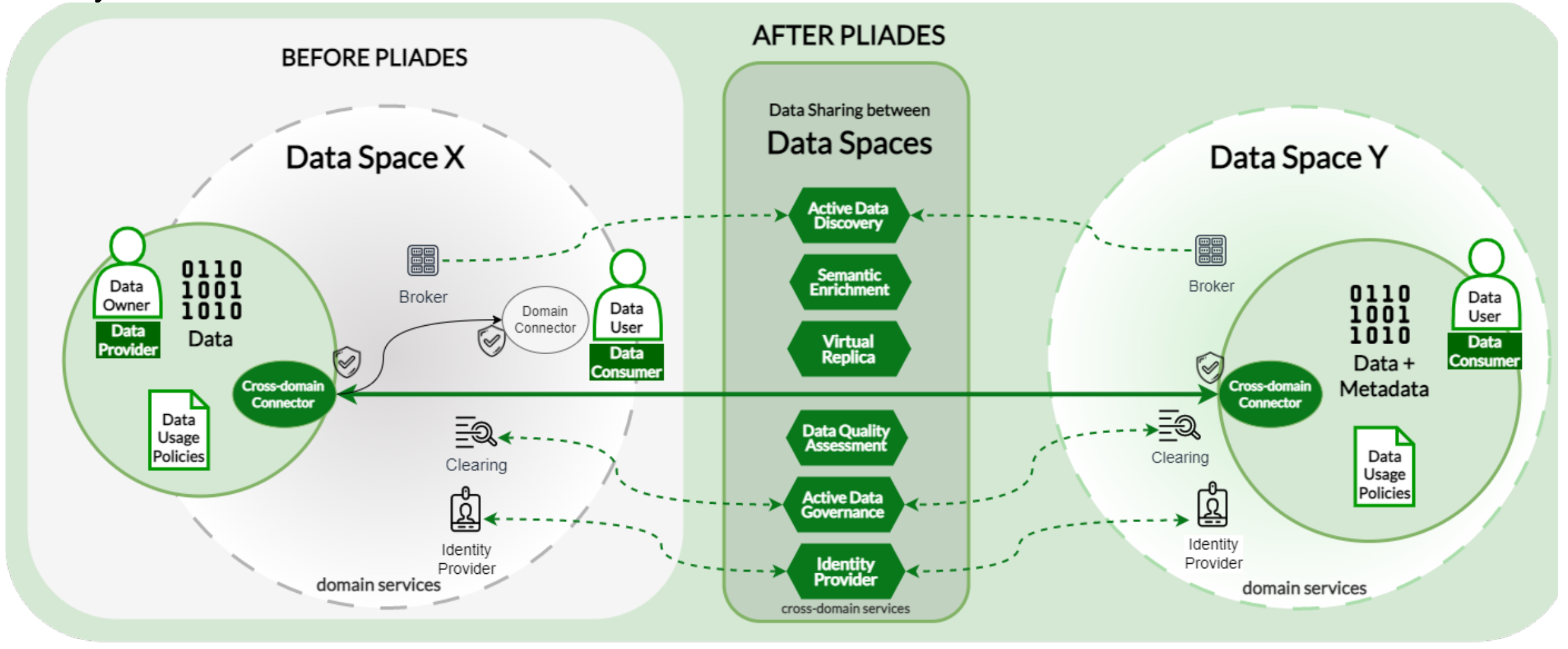FinEst Centre has recently joined project PLIADES in which research will dig into novel AI-enabled tools to advance full data life cycles integration, both within and between data spaces.

News
Project PLIADES takes dataspace architecture into new era for AI and robotics
Published on 22.01.2024
Written by Mauro Bellone, FinEst Centre for Smart Cities
Main objectives of the project
PLIADES project aims to take dataspaces architecture into a new era for AI and Robotics. Sustainable data creation methods through data compression, filtering and normalization will be developed, to allow efficient and greener storage in a data-oriented future. Data privacy and sovereignty will be further ensured, through standards and decentralized protocols to protect data-producing organizations and citizens.
Alongside, data sharing will be revolutionized through novel AI-based brokers and connectors using extended metadata, shaped through the project’s best practices and domain expert’s knowledge. On top of these, active data discovery services through cross domain AI connectors will allow creating linked data spaces, enabling interoperability between previously disconnected entities, while data quality assessment services will facilitate real time data evaluation.
Extended synergies with EU initiatives will be established to contribute models, strategies, and technologies for a Common European Data Space.
Project outcomes will be evaluated in six use cases focusing on direct advancements in key AI and Robotics technologies for everyday use, oriented around multiple data spaces; mobility, healthcare, industry, energy and green deal. Those use cases provide a challenging validation suite involving vast heterogeneous data creation, management and sharing while addressing full data lifecycles in multiple major domains. Through the developed ecosystem, CCAM and ADAS/AD car technologies will be enhanced, HRI for robot operators and healthcare patients will be reshaped, while further advanced, integrated data spaces will be deployed in the healthcare, manufacturing and green deal sectors aiming to reduce carbon footprints and shape a greener future.
Before and after PLIADES – in more detail
PLIADES aims to facilitate cross-domain data sharing by enabling users from diverse and heterogeneous data spaces to exchange data safely and seamlessly. The project lays the foundation for the development of a versatile data exchange ecosystem that integrates various data spaces. This is accomplished by extending the specification of IDS RAM with cross-domain data services, which augment the capabilities of IDS Connectors and facilitate decentralized data management as it is presented in the following figure.
In addition, the project presents a cutting-edge data integration framework that places emphasis on the entire data life cycle, while also considering environmental and security factors. Each distinct data space provides a variety of services for data governance and management, data exchange, identity management, certification, and other domain-specific services and authorities. In accordance with the conventional data exchange paradigm of IDS RAM v4.0, each data transaction involves a data provider and a data consumer, as illustrated in the figure.
The data consumer communicates with a metadata broker service to discover data sources (data providers) in the data space. A certification authority verifies the legitimacy of both parties and grants them permission to exchange data through connector services. These services offer data transformation capabilities and comply with a specified communication protocol to transmit the data. To promote interoperability, the PLIADES research project suggests a collection of cross-domain services that amalgamate information from various domain services.
 PLIADES project
PLIADES projectFinEst Centre’s role in project
FinEst Centre’s role is to contribute to the elaboration of system requirements and use-cases, and offer technical expertise in data generation, harmonization and re-use focusing on mobility. Prof. Mauro Bellone will have a lead role in delivering those tasks.
From Tallinn University of Tehnology, the autonomous vehicle research group is also involved in the project.
Duration and partners
The duration of the project is 42 months and it involves 27 international partners.
Funding agency: Horizon-CL4-2023-DATA-01-02
Budget
Total: 9.8 mln euros
Tallinn University of Technology: 200k euros


